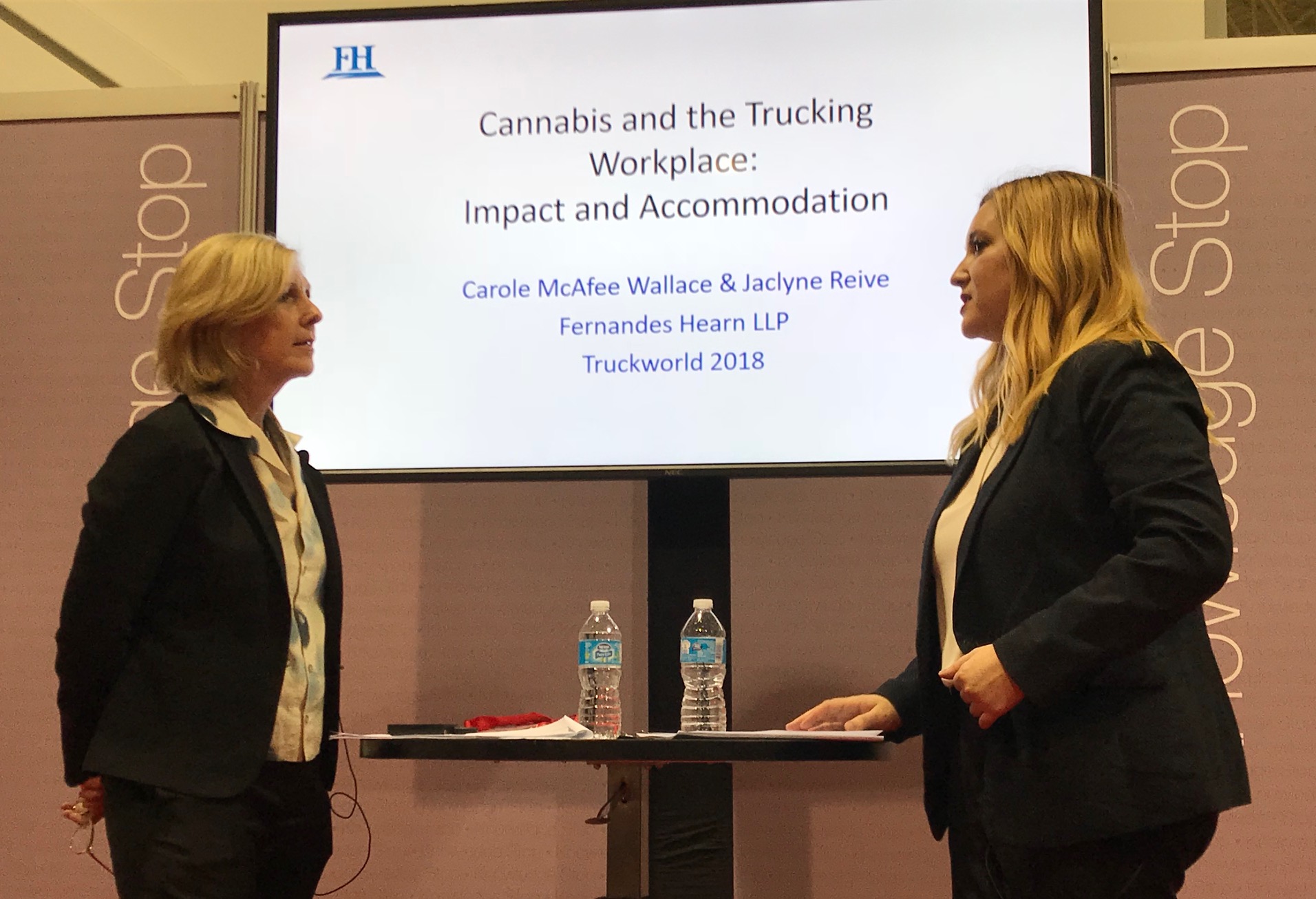Legal marijuana can still present legal headaches

MISSISSAUGA, Ont. – On a day that has become known as 4/20, celebrating the use of marijuana, lawyers from Fernandes Hearn are explaining the many challenges of cannabis in the workplace.
Medical marijuana is already approved under regulations in force since Aug. 24, 2016, and the legalization of the drug for recreational use is expected later this year under what’s become known as the Cannabis Act. While users of medical marijuana need a prescription, recreational users will soon have access through government-controlled dispensaries.
A third reading of the federal rules that will control the production, distribution, sale, import, export, and possession of marijuana is to take place on or before June 7, said counsel Carole McAfee Wallace, during a presentation at the Truck World trade show. It would likely be legal eight to 12 weeks after that.
“It cannot be consumed in a public place, in a workplace, in a vehicle, or boat,” she stressed.
But it will still present some unique challenges for industry employers.
There are differences of opinion around how long users should wait before driving, said associate lawyer Jaclyne Reive. The Canadian Council of Motor Transport Administrators and Health Canada recommend people shouldn’t drive for five hours. The College of Family Physicians sets a range of four to eight hours, depending on the way it’s ingested and the effects.
To compound matters, current tests don’t reliably measure impairment. “There really is no clear guidance with respect to how much is too much,” she said, noting how traces of the drug can stay in someone’s system for up to 30 days. It presents a challenge for commercial drivers who use legalized marijuana during a day off, but work in a jurisdiction like Ontario that won’t allow any trace at all.
Cross-border drivers already face zero tolerance and testing regimes. In Ontario, penalties will include a licence suspension of up to three days for each offence, and fines of $250 to $450 on top of $200 licence reinstatement fees.
Employers then face the push and pull between a duty to accommodate those addicted to the drug, and the responsibility to protect workers and the general public, said McAfee Wallace.
She stresses the need for a clear and detailed “fit for duty” workplace policy. “We should all have this anyway. You don’t want people coming to work under the influence of alcohol or prescription drugs.” Still, the policies can’t be so broad as to ban “illegal drugs”. Because marijuana will no longer be illegal.
Even the period of being fit for duty needs to be defined. For example, all employees could be expected to be fit for duty when reporting to work, and remain fit for duty for the duration of their shift, and must not be impaired by recreational drug or substance, prescribed drug, or substance, or alcohol.
The policy can prohibit consumption or possession of recreational cannabis at work, just like alcohol, she said. So, too, can employees be given a duty to disclose to a designated person if they have a prescription for medical cannabis or another drug.
The details make a difference. In a case known as Stewart vs. Elk Valley Coal, the Alberta Human Rights Tribunal ruled that an employee was dismissed for breaching a related workplace policy, rather than because of his addiction.
Even if someone breaks the rules, however, employers have a duty to accommodate. And there are limits here as well.
“You’re going to accommodate a disability to the point of undue hardship,” McAfee Wallace said. For a large company, that may mean moving the employee to another job. Small workplaces might simply need to offer a leave of absence while a worker is treated for an addiction.
McAfee Wallace questions whether contracts with owner-operators could simply be terminated. “It’s tricky,” she said, responding to a question from the audience. Possible. But tricky.
It’s where a lawyer can define the difference.
Have your say
This is a moderated forum. Comments will no longer be published unless they are accompanied by a first and last name and a verifiable email address. (Today's Trucking will not publish or share the email address.) Profane language and content deemed to be libelous, racist, or threatening in nature will not be published under any circumstances.